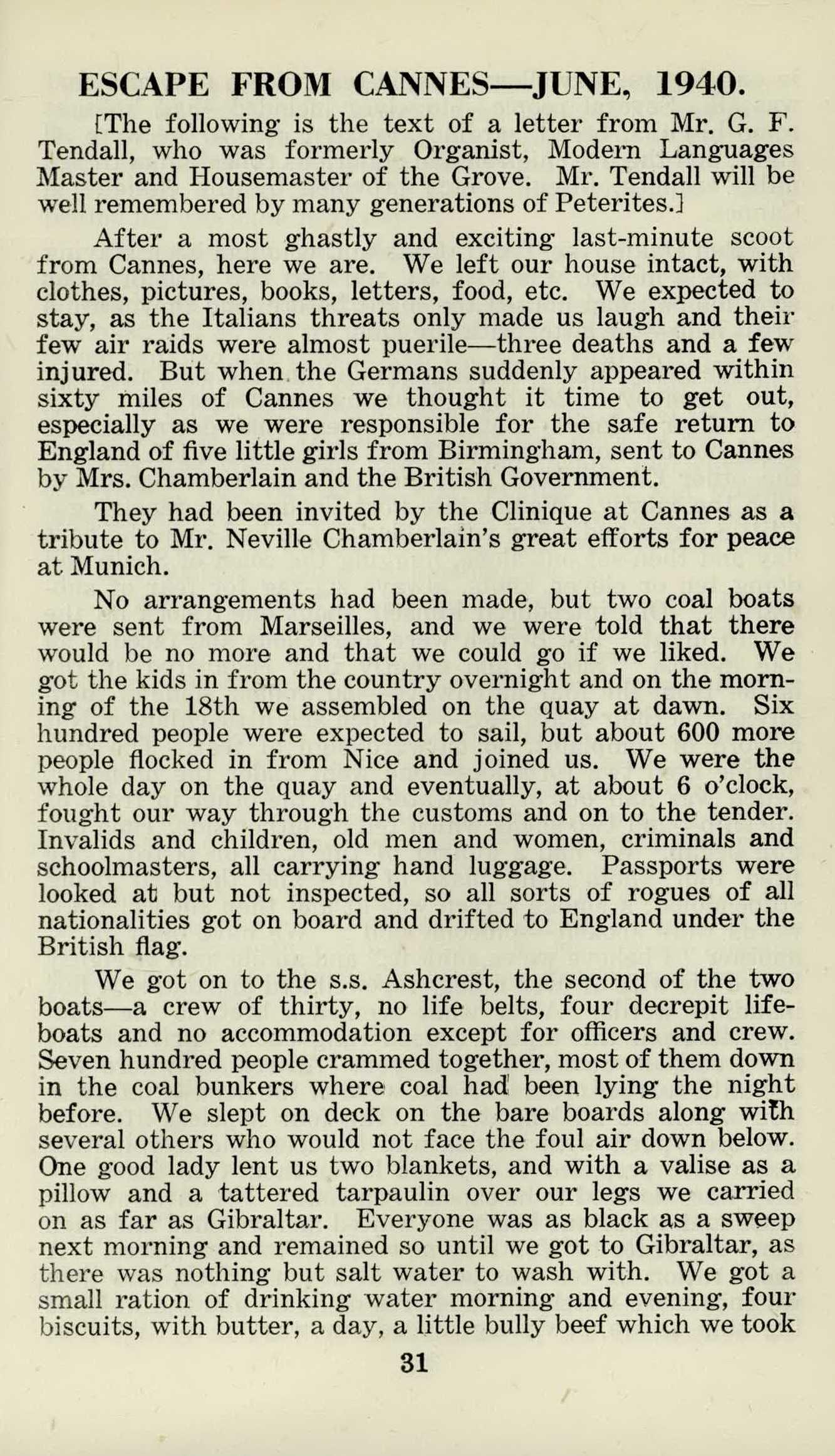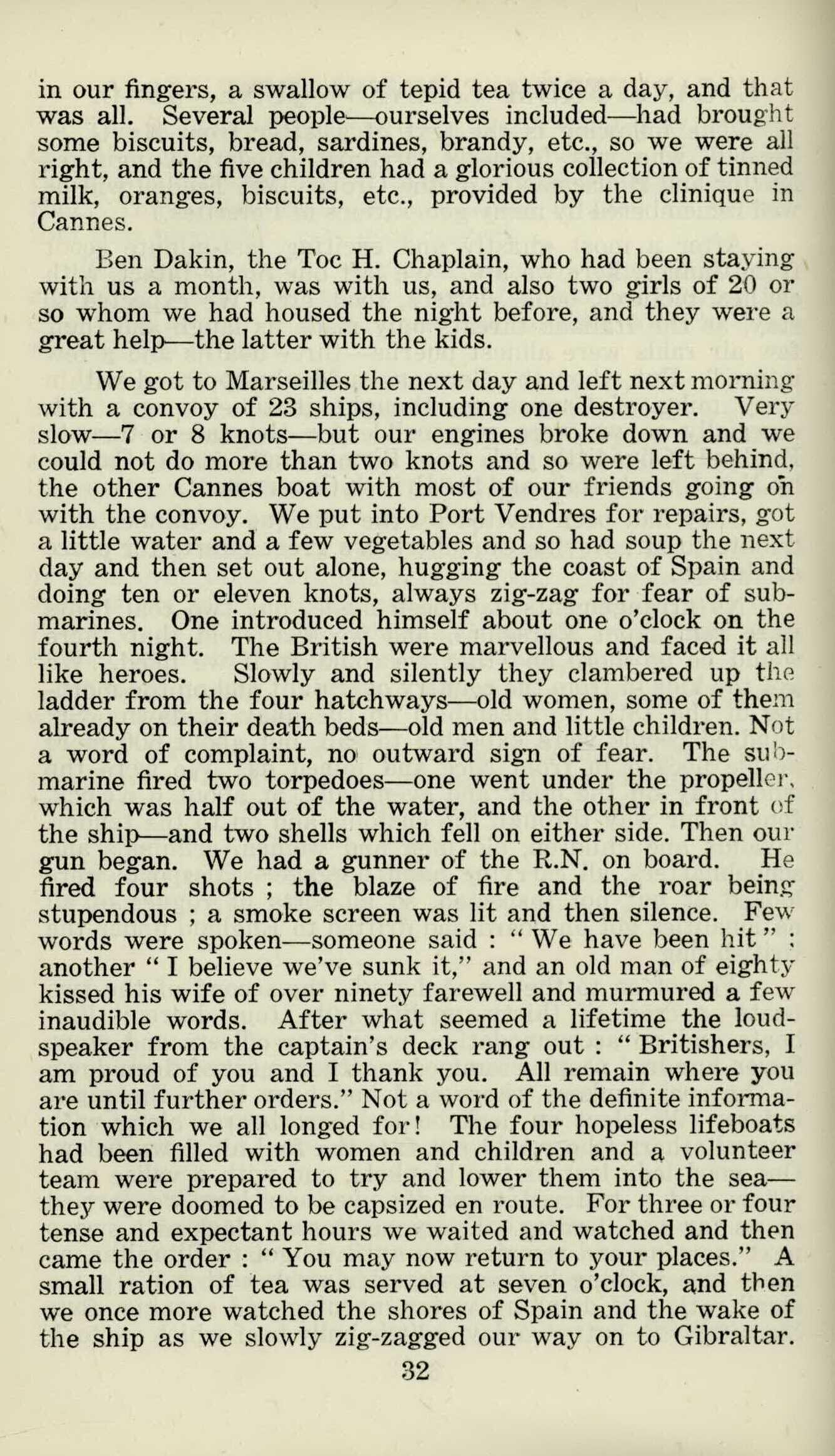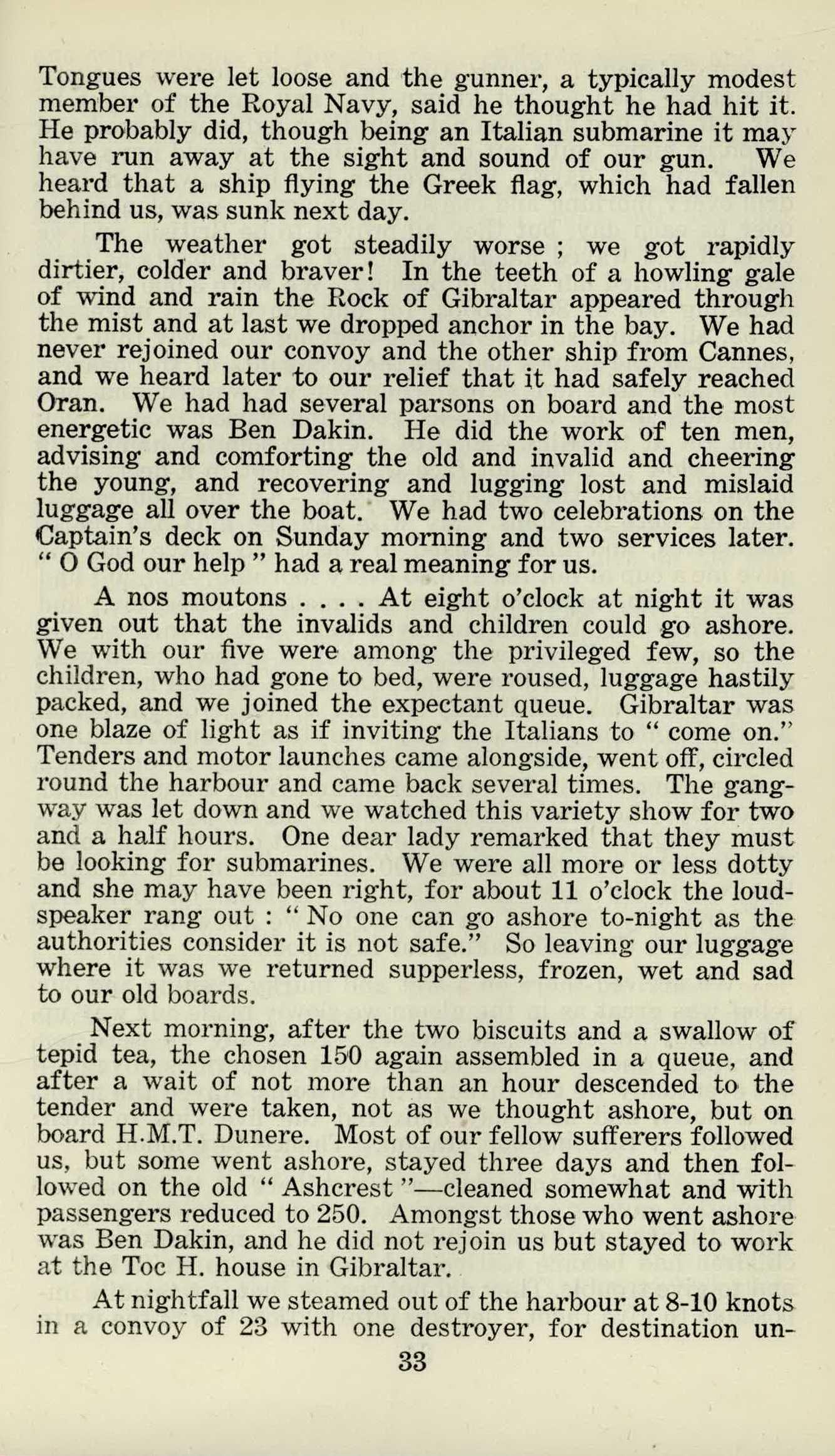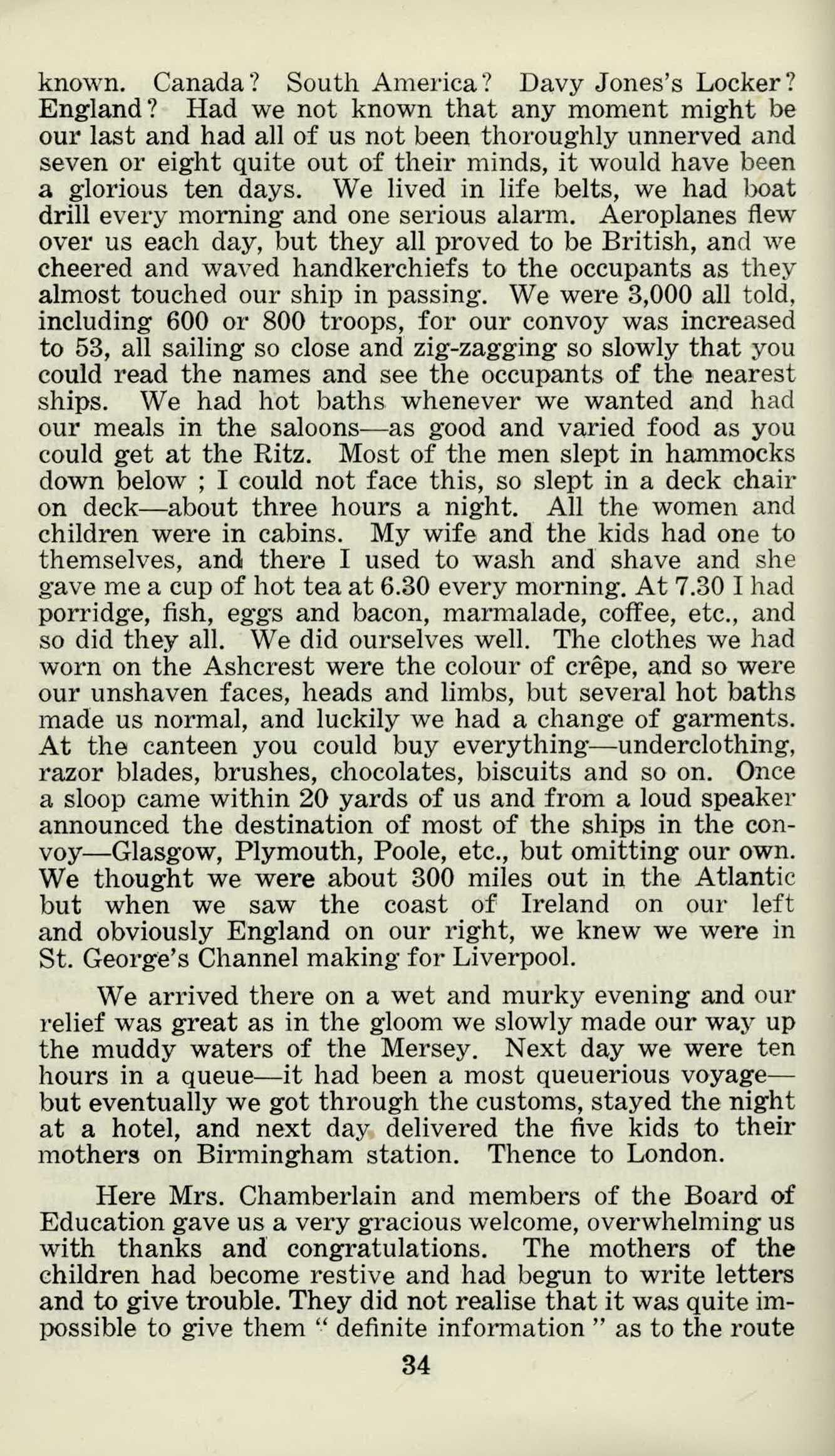
9 minute read
Escape from Cannes
from May 1941
by StPetersYork
[The following is the text of a letter from Mr. G. F. Tendall, who was formerly Organist, Modern Languages Master and Housemaster of the Grove. Mr. Tendall will be well remembered by many generations of Peterites.1
After a most ghastly and exciting last-minute scoot from Cannes, here we are. We left our house intact, with clothes, pictures, books, letters, food, etc. We expected to stay, as the Italians threats only made us laugh and their few air raids were almost puerile—three deaths and a few injured. But when, the Germans suddenly appeared within sixty miles of Cannes we thought it time to get out, especially as we were responsible for the safe return to England of five little girls from Birmingham, sent to Cannes by Mrs. Chamberlain and the British Government.
They had been invited by the Clinique at Cannes as a tribute to Mr. Neville Chamberlain's great efforts for peace at Munich.
No arrangements had been made, but two coal boats were sent from Marseilles, and we were told that there would be no more and that we could go if we liked. We got the kids in from the country overnight and on the morning of the 18th we assembled on the quay at dawn. Six hundred people were expected to sail, but about 600 more people flocked in from Nice and joined us. We were the whole day on the quay and eventually, at about 6 o'clock, fought our way through the customs and on to the tender. Invalids and children, old men and women, criminals and schoolmasters, all carrying hand luggage. Passports were looked at but not inspected, so all sorts of rogues of all nationalities got on board and drifted to England under the British flag.
We got on to the s.s. Ashcrest, the second of the two boats—a crew of thirty, no life belts, four decrepit lifeboats and no accommodation except for officers and crew. Seven hundred people crammed together, most of them down in the coal bunkers where coal had been lying the night before. We slept on deck on the bare boards along with several others who would not face the foul air down below. One good lady lent us two blankets, and with a valise as a pillow and a 'tattered tarpaulin over our legs we carried on as far as Gibraltar. Everyone was as black as a sweep next morning and remained so until we got to Gibraltar, as there was nothing but salt water to wash with. We got a small ration of drinking water morning and evening, four biscuits, with butter, a day, a little bully beef which we took
31
in our fingers, a swallow of tepid tea twice a day, and that was all. Several people—ourselves included—had brought some biscuits, bread, sardines, brandy, etc., so we were all right, and the five children had a glorious collection of tinned milk, oranges, biscuits, etc., provided by the clinique in Cannes.
Ben Dakin, the Toc H. Chaplain, who had been staying with us a month, was with us, and also two girls of 20 or so whom we had housed the night before, and they were a great help—the latter with the kids.
We got to Marseilles the next day and left next morning with a convoy of 23 ships, including one destroyer. Very slow-7 or 8 knots—but our engines broke down and we could not do more than two knots and so were left behind, the other Cannes boat with most of our friends going on with the convoy. We put into Port Vendres for repairs, got a little water and a few vegetables and so had soup the next day and then set out alone, hugging the coast of Spain and doing ten or eleven knots, always zig-zag for fear of submarines. One introduced himself about one o'clock on the fourth night. The British were marvellous and faced it all like heroes. Slowly and silently they clambered up the ladder from the four hatchways—old women, some of them already on their death beds—old men and little children. Not a word of complaint, no outward sign of fear. The submarine fired two torpedoes—one went under the propeller, which was half out of the water, and the other in front of the ship—and two shells which fell on either side. Then our gun began. We had a gunner of the R.N. on board. He fired four shots ; the blaze of fire and the roar being stupendous ; a smoke screen was lit and then silence. Few words were spoken—someone said : " We have been hit " another " I believe we've sunk it," and an old man of eighty kissed his wife of over ninety farewell and murmured a few inaudible words. After what seemed a lifetime the loudspeaker from the captain's deck rang out : " Britishers, I am proud of you and I thank you. All remain where you are until further orders." Not a word of the definite information which we all longed for! The four hopeless lifeboats had been filled with women and children and a volunteer team were prepared to try and lower them into the sea— they were doomed to be capsized en route. For three or four tense and expectant hours we waited and watched and then came the order : " You may now return to your places." A small ration of tea was served at seven o'clock, and then we once more watched the shores of Spain and the wake of the ship as we slowly zig-zagged our way on to Gibraltar. 32

Tongues were let loose and the gunner, a typically modest member of the Royal Navy, said he thought he had hit it. He probably did, though being an Italian submarine it may have run away at the sight and sound of our gun. We heard that a ship flying the Greek flag, which had fallen behind us, was sunk next day.
The weather got steadily worse ; we got rapidly dirtier, colder and braver! In the teeth of a howling gale of wind and rain the Rock of Gibraltar appeared through the mist and at last we dropped anchor in the bay. We had never rejoined our convoy and the other ship from Cannes, and we heard later to our relief that it had safely reached Oran. We had had several parsons on board and the most energetic was Ben Dakin. He did the work of ten men, advising and comforting the old and invalid and cheering the young, and recovering and lugging lost and mislaid luggage all over the boat. We had two celebrations on the Captain's deck on Sunday morning and two services later. " 0 God our help " had a real meaning for us.
A nos moutons . . . . At eight o'clock at night it was given out that the invalids and children could go ashore. We with our five were among the privileged few, so the children, who had gone to bed, were roused, luggage hastily packed, and we joined the expectant queue. Gibraltar was one blaze of light as if inviting the Italians to " come on." Tenders and motor launches came alongside, went off, circled round the harbour and came back several times. The gangway was let down and we watched this variety show for two and a half hours. One dear lady remarked that they must be looking for submarines. We were all more or less dotty and she may have been right, for about 11 o'clock the loudspeaker rang out : " No one can go ashore to-night as the authorities consider it is not safe." So leaving our luggage where it was we returned supperless, frozen, wet and sad to our old boards.
Next morning, after the two biscuits and a swallow of tepid tea, the chosen 150 again assembled in a queue, and after a wait of not more than an hour descended to the tender and were taken, not as we thought ashore, but on board H.M.T. Dunere. Most of our fellow sufferers followed us, but some went ashore, stayed three days and then followed on the old " Ashcrest "—cleaned somewhat and with passengers reduced to 250. Amongst those who went ashore was Ben Dakin, and he did not rejoin us but stayed to work at the Toc H. house in Gibraltar.
At nightfall we steamed out of the harbour at 8-10 knots in a convoy of 23 with one destroyer, for destination un- 33

known. Canada ? South America? Davy Jones's Locker ? England ? Had we not known that any moment might be our last and had all of us not been thoroughly unnerved and seven or eight quite out of their minds, it would have been a glorious ten days. We lived in life belts, we had boat drill every morning and one serious alarm. Aeroplanes flew over us each day, but they all proved to be British, and we cheered and waved handkerchiefs to the occupants as they almost touched our ship in passing. We were 3,000 all told, including 600 or 800 troops, for our convoy was increased to 53, all sailing so close and zig-zagging so slowly that you could read the names and see the occupants of the nearest ships. We had hot baths whenever we wanted and had our meals in the saloons—as good and varied food as you could get at the Ritz. Most of the men slept in hammocks down below ; I could not face this, so slept in a deck chair on deck—about three hours a night. All the women and children were in cabins. My wife and the kids had one to themselves, and there I used to wash and shave and she gave me a cup of hot tea at 6.30 every morning. At 7.30 I had porridge, fish, eggs and bacon, marmalade, coffee, etc., and so did they all. We did ourselves well. The clothes we had worn on the Ashcrest were the colour of crêpe, and so were our unshaven faces, heads and limbs, but several hot baths made us normal, and luckily we had a change of garments. At the canteen you could buy everything—underclothing, razor blades, brushes, chocolates, biscuits and so on. Once a sloop came within 20 yards of us and from a loud speaker announced the destination of most of the ships in the convoy—Glasgow, Plymouth, Poole, etc., but omitting our own. We thought we were about 300 miles out in the Atlantic but when we saw the coast of Ireland on our left and obviously England on our right, we knew we were in St. George's Channel making for Liverpool.
We arrived there on a wet and murky evening and our relief was great as in the gloom we slowly made our way up the muddy waters of the Mersey. Next day we were ten hours in a queue—it had been a most queuerious voyage— but eventually we got through the customs, stayed the night at a hotel, and next day delivered the five kids to their mothers on Birmingham station. Thence to London.
Here Mrs. Chamberlain and members of the Board of Education gave us a very gracious welcome, overwhelming us with thanks and congratulations. The mothers of the children had become restive and had begun to write letters and to give trouble. They did not realise that it was quite impossible to give them " definite information " as to the route
34











